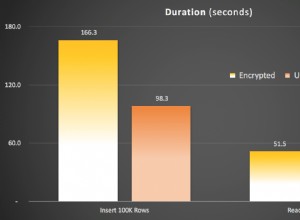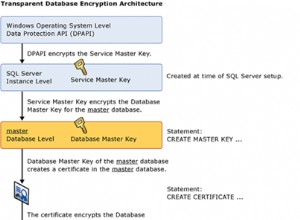Si prega di ignorare eventuali rischi per la sicurezza con questo approccio
Non farlo così . Non importa se la sicurezza verrà prima o dopo. Finirai di riscrivere l'intero codice perché la password è codificato nella tua applicazione che può essere decompilato e recuperato facilmente . Esegui la connessione nel modo corretto ora in modo da non dover riscrivere l'intera applicazione.
Esegui il comando del tuo database sul tuo server con php, perl o qualsiasi lingua tu abbia dimestichezza, ma questo dovrebbe essere fatto sul server.
Da Unity, usa il WWW o UnityWebRequest classe per comunicare con quello script e quindi sarai in grado di inviare e ricevere informazioni da Unity al server. Ci sono molti esempi là fuori. Anche con questo, devi comunque implementare la tua sicurezza, ma questo è molto meglio di quello che hai ora.
Puoi anche ricevere dati multipli con json.
Di seguito è riportato un esempio completo da questo wiki Unity. Mostra come interagire con un database in Unity usando php sul lato server e Unity + C# sul lato client.
Lato server :
Aggiungi punteggio con PDO :
<?php
// Configuration
$hostname = 'localhot';
$username = 'yourusername';
$password = 'yourpassword';
$database = 'yourdatabase';
$secretKey = "mySecretKey"; // Change this value to match the value stored in the client javascript below
try {
$dbh = new PDO('mysql:host='. $hostname .';dbname='. $database, $username, $password);
} catch(PDOException $e) {
echo '<h1>An error has ocurred.</h1><pre>', $e->getMessage() ,'</pre>';
}
$realHash = md5($_GET['name'] . $_GET['score'] . $secretKey);
if($realHash == $hash) {
$sth = $dbh->prepare('INSERT INTO scores VALUES (null, :name, :score)');
try {
$sth->execute($_GET);
} catch(Exception $e) {
echo '<h1>An error has ocurred.</h1><pre>', $e->getMessage() ,'</pre>';
}
}
?>
Recupera il punteggio con PDO :
<?php
// Configuration
$hostname = 'localhost';
$username = 'yourusername';
$password = 'yourpassword';
$database = 'yourdatabase';
try {
$dbh = new PDO('mysql:host='. $hostname .';dbname='. $database, $username, $password);
} catch(PDOException $e) {
echo '<h1>An error has occurred.</h1><pre>', $e->getMessage() ,'</pre>';
}
$sth = $dbh->query('SELECT * FROM scores ORDER BY score DESC LIMIT 5');
$sth->setFetchMode(PDO::FETCH_ASSOC);
$result = $sth->fetchAll();
if(count($result) > 0) {
foreach($result as $r) {
echo $r['name'], "\t", $r['score'], "\n";
}
}
?>
Abilita criteri tra domini sul server :
Questo file dovrebbe essere chiamato "crossdomain.xml" e posizionato nella radice del tuo server web. Unity richiede che i siti Web a cui desideri accedere tramite una richiesta WWW dispongano di criteri per più domini.
<?xml version="1.0"?>
<cross-domain-policy>
<allow-access-from domain="*"/>
</cross-domain-policy>
Lato cliente/unità :
Il codice client di Unity si connette al server, interagisce con PDO e aggiunge o recupera il punteggio a seconda della funzione chiamata. Questo codice client è leggermente modificato per essere compilato con l'ultima versione di Unity.
private string secretKey = "mySecretKey"; // Edit this value and make sure it's the same as the one stored on the server
public string addScoreURL = "https://localhost/unity_test/addscore.php?"; //be sure to add a ? to your url
public string highscoreURL = "https://localhost/unity_test/display.php";
//Text to display the result on
public Text statusText;
void Start()
{
StartCoroutine(GetScores());
}
// remember to use StartCoroutine when calling this function!
IEnumerator PostScores(string name, int score)
{
//This connects to a server side php script that will add the name and score to a MySQL DB.
// Supply it with a string representing the players name and the players score.
string hash = Md5Sum(name + score + secretKey);
string post_url = addScoreURL + "name=" + WWW.EscapeURL(name) + "&score=" + score + "&hash=" + hash;
// Post the URL to the site and create a download object to get the result.
WWW hs_post = new WWW(post_url);
yield return hs_post; // Wait until the download is done
if (hs_post.error != null)
{
print("There was an error posting the high score: " + hs_post.error);
}
}
// Get the scores from the MySQL DB to display in a GUIText.
// remember to use StartCoroutine when calling this function!
IEnumerator GetScores()
{
statusText.text = "Loading Scores";
WWW hs_get = new WWW(highscoreURL);
yield return hs_get;
if (hs_get.error != null)
{
print("There was an error getting the high score: " + hs_get.error);
}
else
{
statusText.text = hs_get.text; // this is a GUIText that will display the scores in game.
}
}
public string Md5Sum(string strToEncrypt)
{
System.Text.UTF8Encoding ue = new System.Text.UTF8Encoding();
byte[] bytes = ue.GetBytes(strToEncrypt);
// encrypt bytes
System.Security.Cryptography.MD5CryptoServiceProvider md5 = new System.Security.Cryptography.MD5CryptoServiceProvider();
byte[] hashBytes = md5.ComputeHash(bytes);
// Convert the encrypted bytes back to a string (base 16)
string hashString = "";
for (int i = 0; i < hashBytes.Length; i++)
{
hashString += System.Convert.ToString(hashBytes[i], 16).PadLeft(2, '0');
}
return hashString.PadLeft(32, '0');
}
Questo è solo un esempio su come farlo correttamente. Se devi implementare la funzione di sessione e preoccuparti della sicurezza, guarda in OAuth 2.0 protocollo. Dovrebbero esserci librerie esistenti che ti aiuteranno a iniziare con OAuth protocollo.




